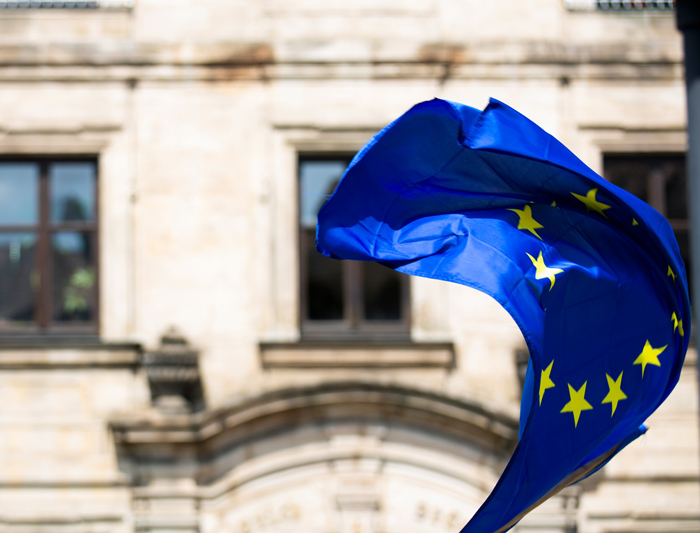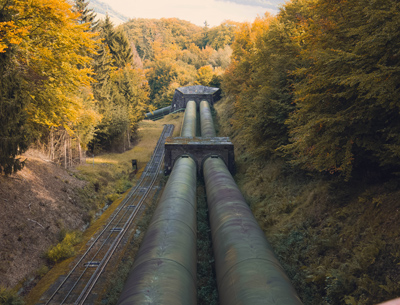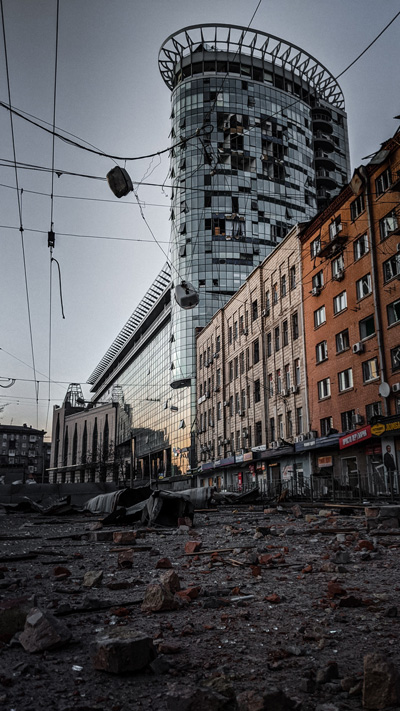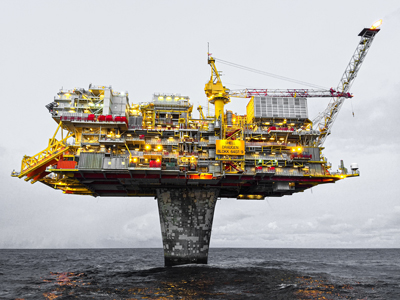Can Europe Play a Leading Role in a Just and Sustainable Energy Transition?
March 8, 2023

March 8, 2023

The armed invasion of Ukraine relaunched Russia’s geopolitical role in an unexpected way. The route towards peace must be achieved by means of a radical change in global governance strategies regarding climate, energy, and industry. The European Union should lead the shift in technological trajectories oriented to a decarbonized world and make a concrete commitment to reducing inequalities globally.
Russia’s armed invasion of Ukraine, launched in February 2022, was initially interpreted as a sign of Putin’s will to reaffirm Russian power on the global scene, a view based on three elements which define the current geopolitical framework.
First, Chinese control over key resources, such as critical raw materials which are geographically concentrated, relatively scarce and destined for the fast-growing digital market. Some 90% of rare earth metals are currently mined by China and this coveted market has contributed to the increasing geopolitical supremacy of China in setting the rules of the game for a world society whose wealth and prosperity is mainly based on Gross Domestic Product (GDP).
Second, the strategy of the United States over the past two decades has been driven by improvement in the security of the supply of energy inputs, where the exploitation of new (environmentally hazardous) technologies for unconventional natural gas extraction brought the US to increase by around 44% its domestic production, practically eliminating the dependency of the US on international energy markets.

And third, pressure by European Union (EU) climate policy to impose a net-zero carbon society is influencing an increasing number of countries to reduce their dependency on fossil fuels, with the result that Russian rent extraction of extra-profits based on its oligopolistic position in the gas and oil markets is at risk of radically diminishing over the next few years.
The resulting conflict has turned into a violent, protracted war of attrition that is drawing increasing resources from an expanding NATO, whose members are pouring billions into military equipment aimed at sustaining Ukraine’s resistance. Despite heavy economic sanctions imposed on Russia by the West, the conflict after one year is still claiming victims on both sides, without clear signs of resolution, at least in the short term. The main reason behind the diplomatic failures until now is the critical geopolitical position of Ukraine, situated on the periphery of the EU and Russia, and constituting the primary route for Russian energy exports to Europe.
The silent battle between these two power blocs over Ukraine was underestimated for decades, primarily because of that country’s rich energy and mineral sources, and also its agricultural crops, vegetable oils and wheat, imported by both the EU and Russia. This explains why the conflict—which could have been expected—found the world, and more importantly the EU, completely unprepared. But the critical position of Ukraine for world systems is not so different from that of other countries on the periphery of Eastern Europe or in Central Asia, where similar competition between super-powers over key natural resources is already occurring.

Therefore, in order to reduce the risk of additional transnational crises, it is important to understand clearly that the Russia-Ukraine conflict serves as the base for deriving more general lessons for the EU’s long term economic strategy, with its embedded objectives of geopolitical stability, energy security, and preventing climate collapse.
Given the strategic roles of Russia and the Ukraine in the network of economic linkages along the global supply chain, both the war and the sanctions have had a domino effect not only on the energy market but also on the system of food production, de facto creating additional pressures throughout the global economy, and in particular on economically and socially vulnerable countries.
the EU defence strategy from the negative economic impacts of the war threaten to worsen the escalating effects of climate breakdown
Along with underdeveloped areas of world, the EU has also abruptly discovered the degree of its vulnerability to external shocks, given its high dependence on Russian fossil fuel imports. Before the onset of the war, in December 2021, some 88% of natural gas consumed by EU members was imported, 40% of which came via pipelines from Russia.
In order to cut the key funds for Putin’s government, namely rents from energy exports, the EU has increased sanctions on imports of Russian fossil fuels. However, the EU consensus on such decisions is not homogeneous, since Eastern European countries, such as Bulgaria, the Czech Republic, Hungary, Poland, and Slovakia are lobbying against an EU fossil fuel embargo, for fear of cutting their ties to Russia. At the same time, many EU countries have managed to reduce their dependency on Russian energy relatively quickly, by reinforcing supply contracts with other, often politically unstable, petrostates, such as Algeria and Egypt, and by building new infrastructures for this purpose.

The direct consequence of the economic efforts invested in this shift of fossil fuel partners is a reduction in the resources available for the decarbonization process, along with a corresponding reduction in the ambition for climate mitigation, at least in the short term, in some EU countries. Moreover, the need to immediately fill the gaps in energy supply have necessitated an increase in fossil fuel extraction in those European countries (mainly Norway) having solid economic relationships with the EU. As a result, the EU defence strategy from the negative economic impacts of the war threaten to worsen the escalating effects of climate breakdown, which are already affecting less resilient areas of the planet.
As the effects of the war ripple through the entire production system, we can see clearly how closely today’s world is interconnected. And we also see how the counter measures taken by certain countries are negatively affecting the planetary climate system. Therefore, a systemic view of the global political economy and international relations points to the imperative design of potential solutions for peace. These must be embedded in a global strategy for reducing vulnerabilities, starting from the assumption that the current governance framework is based on a core-periphery constellation of combined and interdependent development strategies. Indeed, the industrial core of the world’s production systems exploits the economic rent resulting from the surplus of energy, land, labour and raw materials in the extractive periphery, through an unequal exchange of differently valued phases of the supply chain.
Control over this surplus allows the governments of peripheral extractor nations—that is, those in the developing world producing raw materials—to sometimes create a degree of internal socioeconomic order and stability by exploiting the institutional deficiencies within an oligarchic power structure. At the same time, those peripheral nations that are poor in natural resources pay the price in political instability and higher vulnerability to external economic shocks associated with this extractive political economy. The industrial core of the world system—e.g., high-income countries in the developed world—is thus ensuring its own socioeconomic stability by exploiting the flawed political systems and practices in the resource-rich periphery and also the instability and vulnerability in the resource-poor periphery, including the disproportionate burdens they bear from climate change. This is called an Ecologically Unequal Exchange (EUE) of resource exploitation, since the asymmetric transfer of under-compensated natural resources from the periphery to the core leads simultaneously to high economic growth rates in the core and to underdevelopment and environmental degradation in the periphery. The Russia-Ukraine crisis is a key example of the instability occurring in peripheral states, when the extraction surplus can no longer be distributed among elites, and regime stabilization mechanisms become weak. This results in the emergence of forces calling for a return to the status quo or for renewed conflicts that will allow the continued exploitation of political power for private gain.
Thus, the role of core countries in leading the campaign for global governance as a route towards peace is closely connected with at least two issues: the full integration of climate, energy, and industrial strategies into the development process, and the concrete commitment to reducing inequalities of access to resources and well-being.
Accordingly, in the case of the energy insecurity provoked by the Russia-Ukraine war, the short-term strategy should be to immediately invest in all the technological solutions that help countries escape from the carbon trap, rather than focusing exclusively on diplomatic strategies to replace Russian gas with alternative fossil-based energy sources. This is key to increasing geopolitical security as well as economic and social stability, and for discouraging those economic activities responsible for exacerbating the climate crisis. To this end, massive expansion of solar and wind energy and the introduction of energy efficient technologies along the supply chain are the first actions that can accelerate phasing out fossil fuels.
Secondly, it is vitally important for the core countries to sustain all actions directed at favouring social inclusion and addressing basic needs equally, not only domestically, but also by reducing the gaps in the distribution of well-being and access to resources across countries. These measures should be complemented by an accelerated development and deployment of technological and social innovations specifically designed for underdeveloped societies, so that they are immediately applicable, without having to sustain adjustment costs related to the differences in the production and consumption systems of the core and the periphery. It is vitally important for the core to share the technologies with the peripheries of the world with fewer restrictions, as their potential must be maximized fully in order to catch up with the escalating climate crisis.
Obviously, it will be critically important to direct sufficient funds to the financing of such actions. As many such measures are likely to be economically unprofitable, the decisive role of public sources should be acknowledged, at least in the short term. Several alternatives are available, from the more recent instruments for climate financing to the well-established aid-assistance instruments. At the EU level, for example, the newly approved Social Climate Fund, part of the EU’s revised Emission Trading Scheme and the implementation of the “Fit for 55” package could immediately redirect investments toward a sustainable and just transition and reduce the distributive burden of rapid decarbonisation on citizens and between core and peripheral countries, at least at the EU level. Similar mechanisms are currently available at the global level, such as the Green Climate Fund, which is playing a major role in scaling the impact of climate finance for effective adaptation and mitigation.
The foregoing text is more fully elaborated in Costantini, V., Morando, V., Olk, C., Tausch, L. (2022), “Fuelling the fire: Rethinking European policy in times of energy and climate crises.” in Energies 15: 7781.
Written by Valeria Costantini
2020 Global Governance Forum Inc. All Rights Reserved